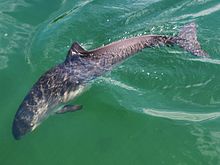A WARNING has been sounded on the hidden threat posed to whales and dolphins by the rush to construct more offshore wind farms
Marine life expert Tania Davey said piling activity on the seabed prior to installation of turbines created "huge amounts of noise" to the potential detriment of sea mammals, fish and invertebrates.
"These creatures are particularly sensitive to noise." the Wildlife Trusts' Living Seas Sustainable Development Officer told the 2018 annual conference of the Greater Lincolnshire Nature Partnership.
Focusing on harbour porpoises, she said they relied on their own echolocation to detect prey and mates.
Excessive noise was liable to cause deafness or other distress, possibly death - especially if it caused them to stop feeding.
 |
| Harbour porpoise (photo: Erik Christensen via Wikimedia Commons) |
Emphasising the need for more research, Ms Davey noted that noise thresholds varied according to species.
They are all hearing at different frequencies - low for minke whales, high for harbour porpoises.
Dolphins have been recorded returned to sites as soon as three days after piling has been completed, but it was not known if these are the same animals or new ones.
Of the next generation of offshore wind farms, she said these would be "humongous in scale - five times the size of the city of Hull, with a kilometre each between the individual turbines".
The speaker was not in favour of using 'pingers' to repel marine animals prior to piling because these devices would only be adding yet more noise to the marine environment.
Instead, she favoured the practice adopted in German waters whereby 'bubble curtains' are required to contain noise within the immediate area of piling.
As yet, this is not a condition imposed on windfarm developments off the British coast.
"Germany is ahead of the UK," she said.
Ms Davey described her work as "fascinating and frustrating at the same time".
She acknowledged that the Government was committed to renewable sources of energy to help combat climate change, but she felt it was also imperative to safeguard the welfare of marine creatures.
 | ||
| Wind farm off the Yorkshire Coast at Spurn |
***
Note - now available via Amazon
https://www.amazon.co.uk/FAULT-NATURE-MIGRATION-PROBLEM-WINDFARMS-ebook/dp/B07D96F9K3/ref=sr_1_1?s=books&ie=UTF8&qid=1541698784&sr=1-1&keywords=birds%2C+migration+and+the+problem+with+windfarms+wright
https://www.amazon.co.uk/FAULT-NATURE-MIGRATION-PROBLEM-WINDFARMS-ebook/dp/B07D96F9K3/ref=sr_1_1?s=books&ie=UTF8&qid=1541698784&sr=1-1&keywords=birds%2C+migration+and+the+problem+with+windfarms+wright


No comments:
Post a Comment